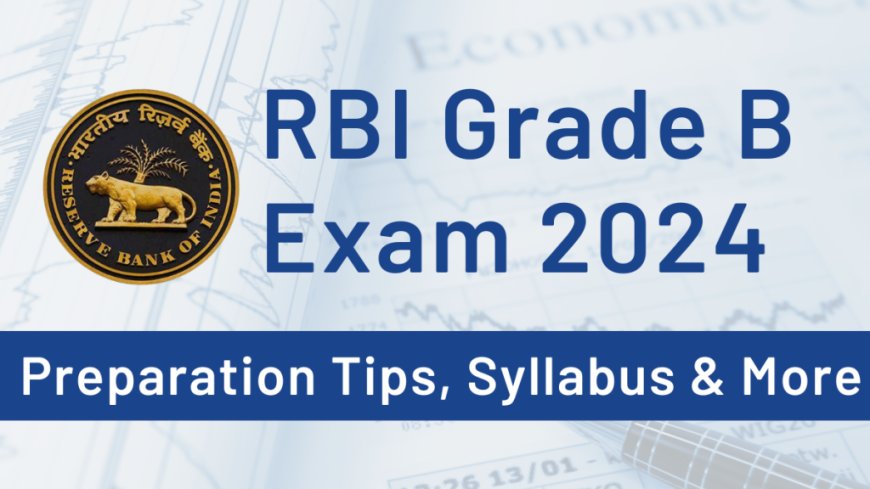Comprehensive Guide to RBI Grade B Examination: Structure, Syllabus, and Preparation Tips
Prepare for RBI Grade B exam effectively with this comprehensive guide on structure, syllabus, and expert tips for success in one of India's top competitive exams.

The Reserve Bank of India (RBI) Grade B examination is one of the most prestigious and competitive exams in India for candidates aspiring to join the central bank. It not only offers a lucrative career path but also plays a crucial role in shaping the country's monetary policies. If you are considering appearing for the RBI Grade B exam, it's essential to understand its structure, syllabus, and effective preparation strategies to increase your chances of success.
Understanding the Structure of RBI Grade B Examination
The RBI Grade B exam is conducted in three phases: Phase 1, Phase 2, and an Interview.
1. Phase 1:
Objective Type: This phase consists of multiple-choice questions (MCQs) aimed at assessing the candidate's quantitative aptitude, reasoning ability, English language proficiency, and general awareness.
Duration and Marking: The exam is conducted for 2 hours, with a total of 200 marks divided equally among the four sections. Each correct answer typically carries one mark, and there might be negative marking for incorrect answers.
2. Phase 2:
Descriptive Type: This phase tests candidates on their knowledge in three subjects: Economic and Social Issues, Finance and Management, and English (Writing Skills).
Duration and Marking: The exam is conducted over a duration of 1.5 to 3 hours, depending on the specific subject. The marks allotted for each section can vary, and the descriptive nature requires candidates to articulate their understanding clearly.
3. Interview:
Personality Assessment: Candidates who qualify Phase 2 are called for an interview. This phase evaluates not only the candidate's knowledge but also their suitability for a career at RBI through a structured interview process.
Detailed Syllabus for RBI Grade B Examination
To excel in the RBI Grade B exam, candidates must have a comprehensive understanding of the RBI Grade B syllabus for each phase:
1. Phase 1 Syllabus:
Quantitative Aptitude: Arithmetic, Data Interpretation, and Mathematical Reasoning.
Reasoning Ability: Verbal and non-verbal reasoning, logical reasoning.
English Language: Grammar, vocabulary, comprehension, and writing ability.
General Awareness: Current affairs, economic and social issues, banking awareness.
2. Phase 2 Syllabus:
Economic and Social Issues: Growth and development, economic reforms, poverty alleviation, globalization, social structure in India.
Finance and Management: Financial system, financial markets, risk management, basics of management theories and practices.
English (Writing Skills): Essay, précis writing, comprehension, and business/office correspondence.
Preparation Tips for RBI Grade B Examination
Preparing effectively for the RBI Grade B exam requires a strategic approach and disciplined study routine. Here are some essential tips:
1. Understand the Exam Pattern and Syllabus:
Begin by thoroughly understanding the exam pattern and syllabus outlined by RBI.
Allocate time based on the weightage of each section to ensure balanced preparation.
2. Create a Study Plan:
Devise a realistic study plan that covers all subjects and allows for sufficient revision.
Set achievable daily, weekly, and monthly goals to track progress effectively.
3. Refer to Reliable Study Material:
Utilize standard reference books and study material recommended by experts and previous successful candidates.
Regularly update yourself with current affairs through newspapers, magazines, and online resources.
4. Practice Regularly:
Solve previous years' question papers and mock tests to familiarize yourself with the exam format and improve time management.
Focus on improving accuracy and speed while solving practice papers.
5. Improve Writing Skills:
For Phase 2, work on enhancing your writing skills by practicing essay writing, précis writing, and comprehension regularly.
Seek feedback from mentors or peers to refine your writing style and content clarity.
6. Stay Updated with Current Affairs:
Stay updated with national and international news, especially related to economics, finance, and banking sectors.
Make notes of important events, policies, and their implications for thorough preparation.
7. Revision and Self-Assessment:
Allocate sufficient time for revision of all subjects and topics closer to the exam date.
Evaluate your progress regularly through self-assessment tests and identify areas that need improvement.
8. Maintain Physical and Mental Well-being:
Ensure adequate sleep, exercise, and a balanced diet to maintain physical health during preparation.
Practice relaxation techniques like meditation to manage exam-related stress effectively.
Conclusion
Preparing for the RBI Grade B exam requires dedication, thoroughness, and a structured approach. By understanding the exam's structure, mastering the syllabus, and adopting effective preparation strategies, candidates can significantly enhance their chances of success. Remember, consistency and perseverance are key to cracking this prestigious examination and embarking on a rewarding career with the Reserve Bank of India.
What's Your Reaction?



















